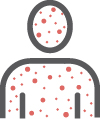Applications
Immunomics integrates data from multiple fields, including the genome, transcriptome, epigenome, and proteome, to study the regulation and control of the immune system, as well as its response to and function in response to infection. Understanding the expression patterns of various immune cell types in the context of networks, rather than as individuals, in order to properly identify and link their responsibilities, is essential. Immunomics is used to study many types of cancer, autoimmune diseases, allergies, transplantation, and infectious diseases.

Cancer cells exist in complex communities with nearby cells, particularly immune cells, which can strongly influence the way cancer cells grow, behave, and communicate with other cells. Immunomics provides comprehensive information in exploring the mechanisms of tumor immune interactions and in detail characterizing tumor immunology.

Immunomics in Autoimmune Diseases
Autoimmune diseases (AIDs) are a group of diseases characterized by a disordered stimulation of an auto-reactive immune response that attacks one's own organs or tissues. Immunomics is widely used to study the pathogenesis of AIDs, identify potential biomarkers, and develop promising diagnostic and therapeutic approaches.

Allergies are driven by genetic, epigenetic, and environmental factors, which lead to early impairment of immune development and disruption of homeostasis within key immune-inflammatory pathways. Immunomics integrates comprehensive omics information to predict or differentiate the phenotypes of allergies and to describe the biomolecular networks behind them, ultimately being integrated into clinical practice.

The success of a transplant between a donor and a recipient is primarily judged by whether the recipient's immune system violently attacks the foreign donor organ or tissue and destroys it after the transplant. The full spectrum of immunomics analysis facilitates the analysis of the immune background on transplantation and the understanding of the immune process after transplantation.

Immunomics in Infectious Diseases
Infectious diseases include the invasion of the body by a variety of pathogens, such as viruses, bacteria, parasites, etc. The complete characterization of the immunome associated with natural infections promises to provide a rich source of biomarkers with potential applications in molecular diagnostics, the follow-up to chemotherapy treatment, and the prioritization of targets for vaccine development.
CD Genomics is made up of a group of experts who study the immune system, high throughput omics, and data analysis. We offer a wide range of immunomics-related services, including immunogenomics analysis, immune cell epigenomics analysis, immune cell transcriptomics analysis, immune cell proteomics analysis, single-cell omics analysis for immune cells, and immunomics bioinformatics services to help clients understand the mechanisms of the immune system and discover novel drug and vaccines.
